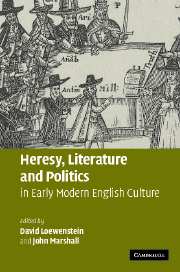Book contents
- Frontmatter
- Contents
- Acknowledgments
- Notes on contributors
- Introduction
- 1 Writing and the persecution of heretics in Henry VIII's England: The Examinations of Anne Askew
- 2 Anabaptism and anti-Anabaptism in the early English Reformation: defining Protestant heresy and orthodoxy during the reign of Edward VI
- 3 “Godlie matrons” and “loose-bodied dames”: heresy and gender in the Family of Love
- 4 Puritanism, Familism, and heresy in early Stuart England: the case of John Etherington revisited
- 5 A ticklish business: defining heresy and orthodoxy in the Puritan revolution
- 6 Thomas Edwards's Gangraena and heresiological traditions
- 7 “And if God was one of us”: Paul Best, John Biddle, and anti-Trinitarian heresy in seventeenth-century England
- 8 The road to George Hill: the heretical dynamic of Winstanley's early prose
- 9 Milton and the heretical priesthood of Christ
- 10 An Historical Narration Concerning Heresie: Thomas Hobbes, Thomas Barlow, and the Restoration debate over “heresy”
- 11 Defining and redefining heresy up to Locke's Letters Concerning Toleration
- 12 “Take heed of being too forward in imposinge on others”: orthodoxy and heresy in the Baxterian tradition
- Index
5 - A ticklish business: defining heresy and orthodoxy in the Puritan revolution
Published online by Cambridge University Press: 20 February 2010
- Frontmatter
- Contents
- Acknowledgments
- Notes on contributors
- Introduction
- 1 Writing and the persecution of heretics in Henry VIII's England: The Examinations of Anne Askew
- 2 Anabaptism and anti-Anabaptism in the early English Reformation: defining Protestant heresy and orthodoxy during the reign of Edward VI
- 3 “Godlie matrons” and “loose-bodied dames”: heresy and gender in the Family of Love
- 4 Puritanism, Familism, and heresy in early Stuart England: the case of John Etherington revisited
- 5 A ticklish business: defining heresy and orthodoxy in the Puritan revolution
- 6 Thomas Edwards's Gangraena and heresiological traditions
- 7 “And if God was one of us”: Paul Best, John Biddle, and anti-Trinitarian heresy in seventeenth-century England
- 8 The road to George Hill: the heretical dynamic of Winstanley's early prose
- 9 Milton and the heretical priesthood of Christ
- 10 An Historical Narration Concerning Heresie: Thomas Hobbes, Thomas Barlow, and the Restoration debate over “heresy”
- 11 Defining and redefining heresy up to Locke's Letters Concerning Toleration
- 12 “Take heed of being too forward in imposinge on others”: orthodoxy and heresy in the Baxterian tradition
- Index
Summary
I knew how ticklish a Business the Enumeration of Fundamentals was, and of what very ill Consequence it would be if it were ill done.
– Richard BaxterPuritanism is often equated with strict Reformed orthodoxy. Historians typically depict the godly as purveyors of hardline Calvinism, driven by intense predestinarian convictions. Indeed, one of the most popular definitions of Puritans dubs them “experimental [i.e. experiential] Calvinists.” Whatever their differences on other matters, we tend to assume that the godly shared a common theology, one profoundly shaped by the writings of John Calvin, Theodore Beza, and William Perkins, whom some have called “the trinity of the orthodox.”
Yet as recent scholarship has demonstrated, the godly were often at odds with each other in matters theological, and such doctrinal consensus as existed did not come easily. As early as the mid-sixteenth century, some zealous Protestants rejected predestinarianism, to the embarrassment of the martyrologist John Foxe, who covered over deviations from Reformed orthodoxy among the martyrs. In the early seventeenth century, the General Baptists, who emerged from a strongly Puritan milieu, also embraced a free-will theology under the influence of Dutch Mennonites. Although the subculture of the godly was typically characterized by conventional Calvinist orthodoxy, it could throw up spectacular cases of heterodoxy, such as that of Edward Wightman, who in 1612 was burned at the stake in Lichfield for his “Heretical, Execrable … Opinions,” thus becoming the last person to be executed for heresy in England.
- Type
- Chapter
- Information
- Heresy, Literature and Politics in Early Modern English Culture , pp. 108 - 136Publisher: Cambridge University PressPrint publication year: 2006
- 5
- Cited by



